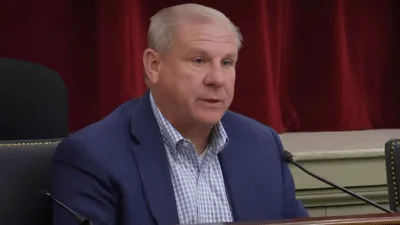Two weeks ago, a female student at Oak Park and River Forest High School was caught on video viciously assaulting another female student while she sat in the school cafeteria.
The fight, a barrage of punches to the head of the victim made the social media rounds. The attacker, concerned parents learned, received only a one-day suspension.
Parents interviewed by West Cook News say fights are becoming commonplace at the high school. They blame District 200’s equity push to narrow achievement gaps between black and white students, and a lax disciplinary policy.

Joylynn Pruitt-Adams
| ORRFHS.org
“I’m aware of at least six fights just this year, one happened between two boys in a hallway a couple days after the cafeteria fight,” one OPRF parent, who asked not to be identified to protect children at the school, told West Cook News. “I’m all for narrowing the achievement gap and restorative justice, but there’s a direct correlation between the number of fights and this push for equity.”
In April, the school board approved a racial equity policy. In August, it announced plans to detrack the freshman class beginning with the 2021-22 school year -- the new policy would end the practice of dividing freshmen into college placement and honors levels.
And in 2016, the high school established a committee “to eliminate disproportionate discipline for students of color.” The year before, the General Assembly approved controversial student discipline legislation, SB 100, to end the “school-to-prison” pipeline.
“Senate Bill 100 explicitly requires that schools minimize exclusionary discipline practices such as suspension and expulsion, while increasing use of alternatives to suspension,” an analysis of the legislation by the Springfield Education Association said.
OPRF spokesperson Jackie McGooey said that privacy laws prohibit the school from confirming disciplinary action taken against the student seen in the video throwing punches, and if the victim of the assault was injured in the attack. An Oak Park Police Department spokesman did not return a call for comment on the incident.
Another parent, who likewise preferred to remain anonymous, said that the one-day suspension the student received would likely have the opposite of the desired effect.
“The culture has changed so much in the school from an academic one that a one-day suspension has become like a badge of honor to students, especially if it’s an in-school suspension,” the parent said.
State and federal laws do prohibit schools from releasing information on students, but parents say that on top of being worried about the safety of their children at the high school they resent getting their information about the fights through their kids, hearsay and social media posts.
The plan to detrack the freshman class at the start of the 2021-22 school year has been criticized for producing flat, and even negative results, in other schools that have tried the same approach.
In adopting the plan, OPRF District 200 administrators pointed to a detracking effort at Evanston Township High School (ETHS) adopted in 2010. But even ETHS board members disagree on whether the detracking, or other efforts to narrow the achievement gap, have made any difference.
SB 100, and relaxed discipline policies, stem from the Obama Administration’s 2014 funding threat against schools that continued disproportionate disciplining of students of color (the “Dear Colleague" policy). But the policy, based on disparate-impact analysis – that disproportionate disciplining in and of itself makes the practice discriminatory -- has been debunked. Manhattan Institute’s Heather MacDonald noted that last year a federal commission on school safety renounced the use of disparate-impact analysis in evaluating whether school discipline is racially biased.
“The Obama administration held that the only possible reason why blacks are disciplined in school more than whites is teacher and administrator bias,” wrote MacDonald, who authored "The Diversity Delusion: How Race and Gender Pandering Corrupt the University and Undermine Our Culture." “Never mind that teaching is the most ‘woke’ profession in the country after social work, with education schools frantically indoctrinating their students in white privilege and critical race theory. And so school districts, threatened with a loss of federal funding if they didn’t reduce racial disparities in discipline, left disruptive students in the classroom rather than removing them.
“The results were predictable: chaos and less learning than ever," she continued. "In Des Moines, for example, students hit teachers and other students with little consequence, according to the Des Moines Register, leading to a teacher exodus. A nine-year-old boy was repeatedly struck by a fellow student, but the teacher felt powerless to do anything lest she be accused of discriminating against a minority student.”
According to the OPRF website, 56 percent of the 3,400 students at OPRF identify as white, 20 percent identify as African American, 12 percent as Hispanic, 9 percent as multiracial, and 3 percent as Asian. The differences in achievement levels are pronounced.
The Chicago Tribune reported that in 2003, white OPRF students compiled an average ACT score of 25.1 while black OPRF students scored an average of 18.4.
“While those scores overall increased over that 12-year period, the gap between white and black students grew larger,” the report said. “By 2015, white students held a composite ACT score of 27.4, compared to 19.1 for black students. Additional data provided by administrators showed similar trends in recent SAT and PSAT scores.”
OPRF recently agreed to a new three-year contract with Superintendent Joylynn Pruitt-Adams, who has been with the district since 2016.
“Since arriving at OPRF High School, Pruitt-Adams has led the district’s equity initiatives, which included approval of a racial equity policy in April 2019 and creation of a new student equity policy in May 2018, which provided protections for all OPRF students regardless of their gender identity,” the Chicago-Tribune wrote.
In September 2018, the school board approved a salary for Pruitt-Adams of $235,833.86 for the 2018-19 school year.






 Alerts Sign-up
Alerts Sign-up